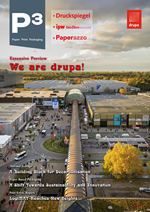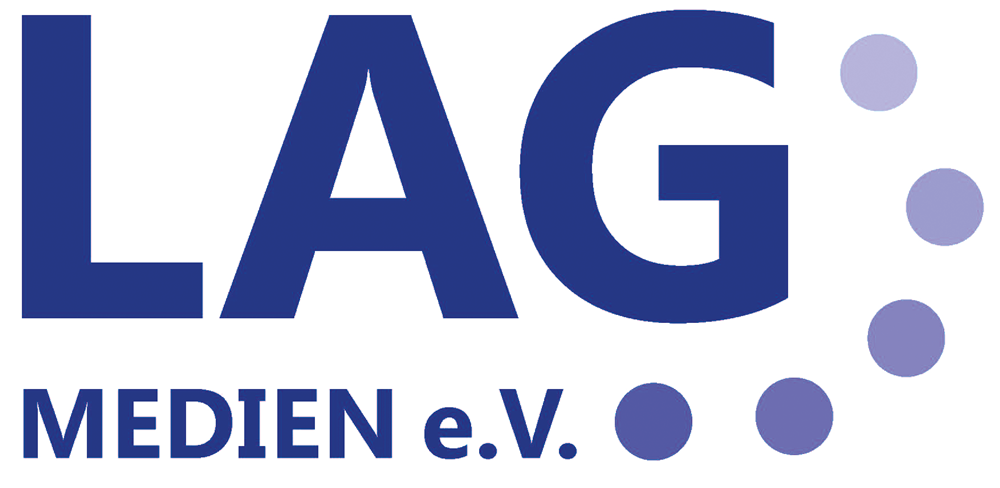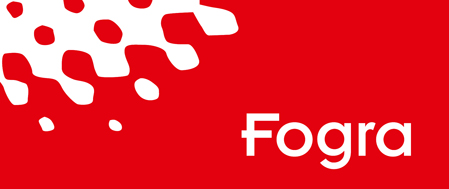P3 3-4/2022 en
Papermaking for Life
By 2030: “CO2-Neutral Paper Production - 100 Percent”
Paper & People
On February 1st, 2022, Dr. Michael Weiß started in his new role as Chief Technology Officer (CTO) at Voith Paper in Heidenheim, succeeding Frank Opletal, who went into well-deserved retirement. In this position, Dr. Weiß is responsible for a large service portfolio - and great efforts with a view to sustainability of the in-house products and services now and in the future. A few weeks ago, the company launched the “Papermaking for Life” campaign. In the following interview you can read what is already possible in paper production thanks to efficient solutions - and what potential is still to be leveraged in the future - keywords here are CO2 emissions and material cycles, but also water and energy consumption.
The extensively modified pilot coating machine at the Heidenheim Technology Center.
Dr. Weiß, it ran on practically all relevant channels: Voith Paper is launching the “Papermaking for Life” sustainability program. My first thought was: “Why now?”
For years we have been committed to paper production that is as sustainable and resource-saving as possible. With the help of efficient production technologies, we can already save up to 20 percent of fibres, energy and water. For example, through continuous improvements we have been able to reduce the energy consumption of stock preparation by 20 percent in recent years. Our Papermaking 4.0 digitalization and automation portfolio currently includes more than 25 solutions that significantly increase the availability and efficiency of the systems. So, thanks to digital solutions, savings of up to 10 percent in CO2 emissions are possible. And with our AquaLine Zero concept, we have developed a closed water circulation system that only requires 1.5 liters of fresh water per kilogram of paper produced and emits 0 liters of waste water. As a leading full-line-supplier, we see it as our responsibility to offer the most sustainable solutions on the market. Based on this, we started the sustainability program “Papermaking for Life”. Our aim is to focus even more strongly on this topic and to actively help shape the future of paper production. As part of the innovation offensive, we have therefore also specified our fields of action and set ourselves ambitious goals by 2030. We are thus taking on a pioneering role in the industry and investing around 100 million euros per year in the development of new, more efficient and sustainable solutions. It is clear that we have to work together across the entire value chain, because sustainability and resource efficiency affect all market participants. We are therefore involved in various industry initiatives. Two examples here are the Modellfabrik Papier, in which completely disruptive approaches to reducing energy requirements and CO2 emissions in paper production are being researched, and the 4evergreen Alliance, which is aiming for a paper recycling rate of 90% by 2030.
One of our goals by 2030 is to enable a 100 percent CO2-neutral paper production through the use of energy-optimized products, digital solutions and renewable energies.
Dr. Michael Weiß, Chief Technology Officer at Voith Paper.
Which measures does Voith Paper intend to implement in detail?
One of our goals by 2030 is to enable a 100 percent CO2-neutral paper production through the use of energy-optimized products, digital solutions and renewable energies. With the help of disruptive technologies, we will be able to reduce fresh water consumption in paper production by up to 90 percent. We also want to increase the recycling rate of paper to 90 percent by 2030 using new fiber streams.
Accordingly, our focus is on minimizing energy, water and fiber consumption. With every development project, we check whether the solution contributes to more sustainable and efficient production. Just recently, for example, we launched the new InduraClean product family. With a continuously improved cleaner bank, the optimized InduraClean IDC-5 and the new InduraClean IDC-4, customers can reduce their energy consumption by up to 50 percent. The cleaners are quickly installed and can be combined in modules. As a full-line-supplier, we have decades of expertise and offer our customers individual advice and services. Even small conversions of existing systems can lead to more sustainable production. We also work with various customers in pilot projects to develop new, innovative solutions.
The official press release said: “Energy savings of up to 30 percent are possible by 2030 through energy-optimized products and digital solutions.” How do you go about determining such figures?
To do this, we look at our product portfolio, current projects and customer references and compare the determined consumption values with historical process and performance data. Data from our test facilities, for example from the Fiber Technology Center and from our new pilot coater, which we use to develop and extensively test new technologies, also come into play here. Based on this data and information, and not least with the help of mathematical simulations, we have carried out various potential assessments. Incidentally, the development of machines, products and processes at Voith Paper is already accompanied by the construction and use of digital twins - hybrid mathematical models for which both physical laws and data-based models are used. We will continue this strategy in the further life cycle of our technologies and products. Another example of this is the Voith Paper OnPerformance.Lab, in which data analysis and process experts help our customers to maximize the productivity, efficiency and availability of their production facilities.
In view of the current crises (pandemic, Ukraine, energy, demand...), are the prospective information on potential savings reliable at all?
The most efficient use of renewable energy sources and raw materials is particularly relevant in the current situation and contributes significantly to competitiveness. The number of customers interested in sustainable concepts has increased significantly in recent times, and we assume that interest will continue to increase in the future.
Everyone involved must pull together so that sustainability in paper production can continue to be promoted.
Dr. Michael Weiß, Chief Technology Officer at Voith Paper.
At the same time, of course, everyone involved must pull together so that sustainability in paper production can continue to be promoted. For disruptive approaches in particular, the solutions must be economically viable. However, this is increasingly the case against the background of sharply rising prices for fossil energy and especially gas, and also accompanied by rising costs for CO2 taxes. Another more important aspect, which does not only apply to the paper industry, is the current effort to become increasingly independent of these fossil forms of energy. Basically, it can be said that the trend in industry towards more sustainability and in particular towards decarbonization is unbroken and has been strengthened by the recent crises.
Clear framework conditions and reliable decisions on the part of politics and legislation are important. It is important to set the course for the long term and to support the transformation of the industry profitably. The expansion of renewable energies and the associated necessary infrastructure, such as transport networks and storage systems, should continue to be supported. In addition, it is important to promote low-CO2-emission production technologies.
Can you introduce our readers to the AquaLine water management system?
Together with our subsidiary Meri, we presented the AquaLine water management system last year. With the help of closed water circuits, customers can significantly reduce their fresh water and waste water consumption. Depending on the system and the objective, Voith offers different concepts:
- The AquaLine water management system is suitable for existing production lines for packaging paper and cardboard. With the system, the fresh water supply can be reduced to 7 litres/kg of paper produced.
- The AquaLine Flex system variant is designed for new plants and existing production lines for packaging paper and can reduce fresh water consumption to around 5.5 litres/kg and the amount of waste water to around 4 litres/kg.
- The wastewater-free system variant AquaLine Zero can be installed in new plants for packaging paper. By biologically cleaning the wastewater within the process, 100 percent of it can be fed back into the water cycle. The fresh water consumption of the AquaLine Zero is a good 1.5 litres/kg. In addition, the concept saves up to 10 percent in CO2 emissions.
With over 300 digital installations worldwide, we are the leading provider of digitalization solutions in the industry.
Dr. Michael Weiß, Chief Technology Officer at Voith Paper.
And what solutions does the Papermaking 4.0 portfolio contain?
Our Papermaking 4.0 digitalization and automation portfolio currently includes more than 25 solutions that significantly increase the system availability and efficiency of our customers’ production resources. With over 300 digital installations worldwide, we are the leading provider of digitalization solutions in the industry. Our OnCare products enable effective asset management by continuously recording machine status in real time. In this way, planned and unplanned downtimes can be minimized. The OnEfficiency solutions optimize paper production for more efficiency and thus save operating costs. The heart of the automation systems is the Quality Control System (QCS) OnQuality. This reliable system is an intelligent and integrated concept that enables manufacturers to control and optimize production processes and product quality.
What are you doing to minimize your own resource requirements for your production?
Sustainability also plays a major role in our own activities. As a family business, we are committed to ecological, fair and economically successful management in the long term. With the help of new technologies, the energy and resource efficiency of our production processes is continuously optimized. Voith has been tracking all relevant consumption indicators at its branches since 2012 and has initiated appropriate improvement projects. As a result, the Voith Paper locations were able to reduce the amount of waste by 33 percent, water consumption by 56 percent and energy consumption by 38 percent in relation to sales by the 2020/21 fiscal year. Our sustainability report makes our commitment to sustainability transparent and measurable. Since 2022, all activities at the Voith locations worldwide have been climate-neutral. The rating agency ISS ESG awarded Voith the top rating B- for its commitment to sustainability. On the basis of more than 100 criteria, Voith's performance in the areas of environment, social affairs and corporate management was rated above average. Voith is thus one of the best companies in the plant and mechanical engineering sector worldwide.
Dr. Weiß, thanks for the interview!

Everything is nothing, right? In any case, it is not possible without the responsible use of resources.
Editor: sbr
Images: Voith Paper









